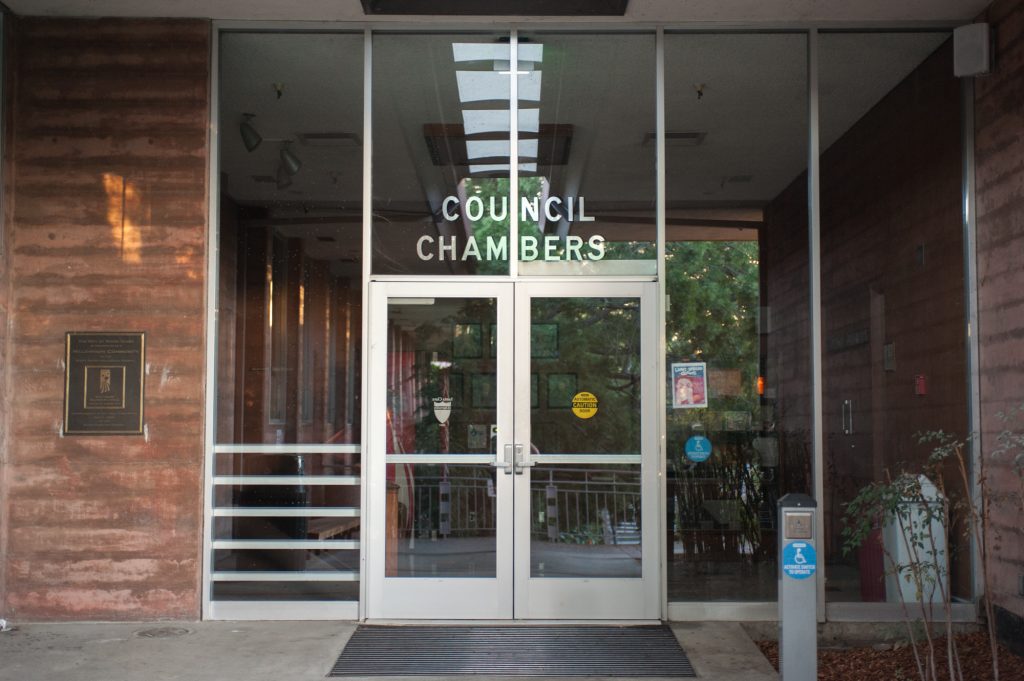At a special Monday night meeting — within days of a judge’s remedy order for Santa Clara’s voting rights violation — the Santa Clara City Council voted unanimously to advance another ballot measure about City elections, this time an advisory vote on whether or not the City should elect its Council by districts. The measure will cost the City almost $100,000.
The hastiness of this move prompted resident Kevin Park to describe the discussion as a case of “fire, ready, aim.”
The 2017 lawsuit was filed six years after the City received its first warning, five years after the Council decided to shelve the advice of a charter review committee to abandon numbered seats, one year after another charter review committee shelved its assignment, and five months after a 2016 warning letter.
In May Superior Court Judge Thomas Kuhnle found that Santa Clara’s at-large by-seat Council election system was discriminatory and violates the California Voting Rights Act (CVRA). He ordered the City to submit districting plans for the remedy phase of the trial, which began on Wednesday.
The City is appealing the judge’s order to create single-member election districts.
Rearranging the Electoral Deck Chairs
Despite the immanence of a court order, the Council embarked on a three-hour discussion about holding an advisory vote on by-district elections, or putting charter changes for two, three or six Council election districts before voters.
Mayor Lisa Gillmor and City Attorney Brian Doyle said that the City wasn’t given “enough time” to consider changing the City Council election system and to look for end runs around voters’ rejection of Measure A.
Doyle said the court order “was not in compliance with the spirit of the election code [to provide] adequate public outreach and accept public input,” reiterating that “the court ordered us to do this.”
Kolstad reminded his colleagues that the City was found in violation of the CVRA by a court.
“Whatever the court orders us to do, we will do because we don’t want to go to jail,” he said.
“It’s a bitter pill for some folks to take because we all have divergent views of what should happen in a perfect world …but bottom line is we’re going to follow the law and obey the judge,” he continued.
Doyle told the Council that if they appealed the Judge’s ordered remedy, “I think the law says it would stay mandatory injunction, in which case the election for November would move forward… under current system … What would the judge do? I can’t tell you.”
Mahan’s assessment of this was that it was “a brilliant strategy in a Machiavellian sort of way,” but indicated that she wouldn’t endorse it, although she would support an advisory vote.
Some were annoyed with the Council’s dilly-dallying.
“I thought we were here to talk about the maps that the ad hoc committee had drawn up and the suggested six council districts,” said Shirley O’Dou.
“It’s a waste of taxpayers money to go through [these] ballot measures. I got three or four communications from the City to educate voters. I think they’ve been educated. It’s time to be in compliance [with what] …the judge decides. Let’s save the $98,000 for the many, many things that are needed in the City.”
Five Proposed Maps But Council Still Burning The Torch For Measure A
The City has submitted five districting maps to the judge — all of which the judge can reject. The first is the failed Measure A plan, re-proposed by Gillmor and described in the City’s court brief as “the best plan for Santa Clara.”
The second is a three-district map created by a member of the charter review committee responsible for Measure A, Hosam Haggag.
The final three plans are six-district plans developed by professional demographer Jeanne Gobalet, who has worked with the City since 2011. One of Gobalet’s plans uses social media platform Nextdoor’s “neighborhood” definitions to draw district boundaries in addition to U.S. census and voting precinct data.
Residents expressed concerns about using a private business’ proprietary methods and users’ self-definition as the basis of public policy, especially as there have been concerns about the promotion of racism on social media.
All of the City’s proposals specify an elected mayor who would continue to function as Santa Clara’s mayor currently does, as a seventh at-large Council Member.
The Council refused to submit to the court or voters a seven district map to the court — no matter how many residents asked for one — because, according to Doyle, such a plan would be against the City Charter requirement for a separately elected mayor and, thus, illegal.*
The Mayor concluded the discussion by restating her opposition to the court and the plaintiffs and her opinion that ignorance and confusion led voters to reject Measure A.
“We shouldn’t wait for one judge to tell us what to do in Santa Clara, even though things may be forced upon us,” said Gillmor. Voters “didn’t like Measure A for various reasons — we all have our ideas why Measure A didn’t pass. Not to mention the plaintiffs and those who ran a campaign against it.
“There was a lot of false information out there,” she continued. “It didn’t pass, we have to respect that … [but] we need to find out what… Santa Clarans want, not a judge or plaintiffs who live somewhere else — other people — telling us what to do in Santa Clara. There is so much confusion out there.”
* For most of the City’s existence the mayor rotated among Council Members. The Charter change making that office a separately elected one was passed in 1968, and was spearheaded by Gary Gillmor. Even though charter cities enjoy more autonomy than general law cities, federal and state law trumps their ordinances. Local government rights — “states rights” — are a common device for attempts to block voting rights law.
